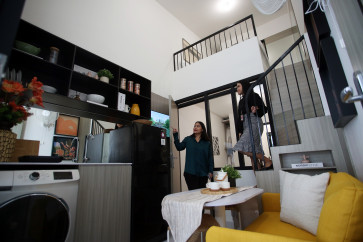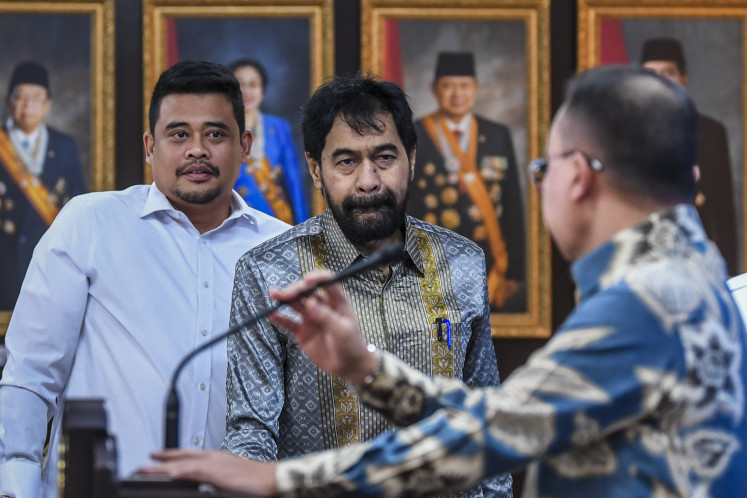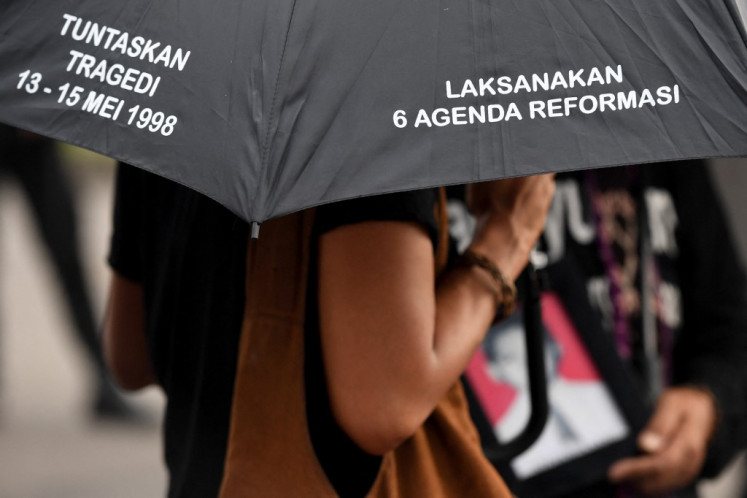Popular Reads
Top Results
Can't find what you're looking for?
View all search resultsPopular Reads
Top Results
Can't find what you're looking for?
View all search resultsPNG and Indonesia: Pursuing alternatives yet overlooking shared concerns
For Indonesia, PNG does not present many challenges except for traditional cross-border crimes, such as illegal trading, illegal trespassing and drug smuggling.
Change text size
Gift Premium Articles
to Anyone

F
ollowing a political attempt to remove him from office last year and ahead of the national election this year, Papua New Guinea (PNG) Prime Minister James Marape visited Jakarta at the invitation of President Joko “Jokowi” Widodo recently.
This trip aimed primarily to respond to the poor economic performance of Marape’s administration over the past three years. Indonesia, which has also experienced economic and political turmoil, deemed the trip strategic to expand its influence in PNG and the Pacific region.
One should ask about prospects of economic cooperation between PNG and Indonesia, the Papua issue and Marape’s tripartite (PNG, Indonesia, Australia) security concept.
Since China has recently been on the rise in the Pacific region, Indonesia has become a strategic alternative for the island countries, including PNG. The increasing presence of China and domination of Australia and New Zealand in the Pacific region has prompted PNG to balance the powerful states with alternative actors, such as Indonesia.
In terms of economy, Indonesia-PNG trade reached US$322 million in 2021, up from $212 million in the previous year, with agricultural products and petroleum dominating the exports of both countries. This fact is in line with Marape’s “Take Back Policy”, which aims to attract international companies operating in PNG’s mining and petroleum business, including Indonesian state energy firm Pertamina.
Likewise, border policies have become a priority within Jokowi’s “development from the periphery” agenda. Significant border facilities in Papua regencies, such as Merauke, Boven Digul, Kerom and Jayapura, reflect Indonesia’s strong commitment to developing the area and benefitting people from both countries.
The only undeveloped border area is Pegunungan Bintang regency. It remains a hotspot of armed conflict in Papua, forcing a significant number of indigenous Papuans to cross into PNG.
Our research (Wangge and Lawson, 2021) also shows that Indonesia gave almost $17 million in aid to the Pacific Island nations from 2014 to 2020, with PNG and Fiji being the biggest recipients. Along with financial support, Indonesia provided humanitarian assistance, capacity building programs and development cooperation in the region, such as ambulance units, vocational training, medical assistance, construction projects and post-disaster relief.
However, those instances of high-level diplomacy and cooperation have not resonated at the grassroots level, which is another priority for both countries.
In terms of people-to-people connection, Indonesians barely see PNG on their regional horizon. There are barely any Pacific-oriented institutions to convey a better understanding of the region.
The Indonesian government-funded Indo-Pacific research center at Cenderawasih University in Jayapura reflects how Indonesia thinks the Pacific region should behave rather than the island countries’ needs and values embedded in Indonesian policies and imagination. Nothing will change in the near future, given that the priority for Indonesian foreign policy is not the Pacific but Asia, the Middle East and even Europe.
Despite the economic-driven meeting between both countries, it still disregards the elephant in the room: the Papua issue. The Marape visit occurred when the issue was a crucial concern in the Pacific region.
Since 2019, the Pacific Regional Forum has urged the Indonesian government to allow the United Nations Human Rights Commission to investigate human rights conditions in Papua. But, so far, the government has resisted inviting the commission on the grounds of internal affairs. Such resistance cannot improve Indonesia’s standing and reinforces empty rhetoric of the country being the biggest Pacific race (Yahya, 2020) in the region.
PNG has been a sanctuary for Papuan political activists and supporters for years. Some Papuan pro-independence leaders coordinated and communicated armed attacks from PNG. Since the 1960s, thousands of indigenous Papuans have crossed the border into PNG due to security concerns over political aspirations for independence.
Last year, almost 1,000 indigenous Papuans from Kiwirok, Pegunungan Bintang regency, crossed the border into PNG following an Indonesian Military (TNI) operation, as reported by Tempo in 2021. The PNG Defense Force lacks the resources to oversee border crossings.
In contrast to how the UN refuge agency dealt with Papuan refugees in the 1980s, as reported by The Guardian in 2019, the agency has insufficient capacity to deal with the influx of Papuan refugees to PNG due to ongoing escalated armed conflict in highland areas.
Marape also highlighted triparty security cooperation between PNG, Indonesia and Australia in his first official visit, which is still premature. Both Indonesia and Australia barely reflected PNG in their security agenda in Asia and the Pacific.
For Indonesia, PNG does not present many challenges except for traditional cross-border crimes, such as illegal trading, illegal trespassing and drug smuggling. Indonesia prefers to pursue Australia and New Zealand than PNG to be part of the Indo-Pacific regional architecture. As an indication, Indonesia’s security cooperation and military exercises with Australia have increased in the past decade rather than with PNG. Moreover, in the past few weeks, Australia’s interest in the Pacific region has been more in containing China’s presence rather than understanding (Wallis, 2021) Pacific Island nations’ interests and values, including those of PNG.
PNG and Indonesia’s relationship reflects strategic continuity, as it has for the past three decades. Both countries need each other to secure their domestic interests and relevant international agendas. Hence, the economy and business will still be at the front line with less pressure on political and security issues.
***
The writer is a researcher and PhD candidate in the School of Culture, History and Language (CHL) at the Australian National University.









